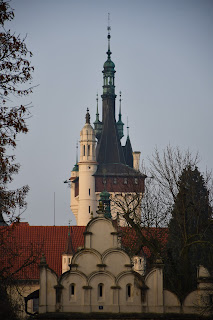The Baltics – Day 5: Jelgava
My tourist itinerary for today was sparse, as I have already seen much of Riga and some of its environs. After checking out and leaving my bag at the hotel, I walked to the train station, where I bought tickets for the train to Jelgava. Jelgava is the largest town in Zemgale (Semigallia) and the erewhile capital of the Duchy of Courland and Semigallia. As many other places in Latvia, the origins of modern Jelgava reach back to the Livonian Order, which ruled the town until its fall in the late sixteenth century. The newly created Duchy of Courland and Semigallia was a vassal state of the Grand Duchy of Lithuania from its inception, and it fell to Russia in the Third Partition of Poland.
My loop around Jelgava began with a quick stop by the
Orthodox Cathedral of Saint Simeon and Saint Ann. The church is remarkable
mostly for its vibrancy: its roof is bright blue, while its walls carry more
subdued pastel colours. Just a few blocks away stands another church: the
Cathedral of the Immaculate Virgin Mary, a soaring gothic-style building built
of red brick and sandstone. Other attractions I saw in Jelgava included the
History and Art Museum of Gederts Eliass, the Saint Trinity Church Tower, and
the Palace. Allegedly the biggest baroque-style palace in the Baltics, it now
serves the needs of the local university.
When I returned to the train station, I found out I
had missed the train back by five minutes and would have to wait for almost an
hour. This did not bother me much, though, as I have become quite adept at going
about my little amusements during such periods.
My first priority upon returning to Riga was to find a
place to eat lunch, after the accomplishment of which I visited the Art Nouveau
Museum. Somewhat grandiosely named, the museum consists of one apartment
restored to its Art Nouveau form, and a cellar with a few trinkets and
multi-media displays. It is housed in a larger townhouse and to enter, one must
ring a bell and be rung in by the receptionist. To the museum’s credit, it is
quite charming that the employees wear flamboyant Art Nouveau-era clothes, and
the staircase of the apartment is truly impressive.
After working at the hotel for a bit, I left for the bus station, where I caught my four-hour long bus ride to Vilnius.


















Comments
Post a Comment